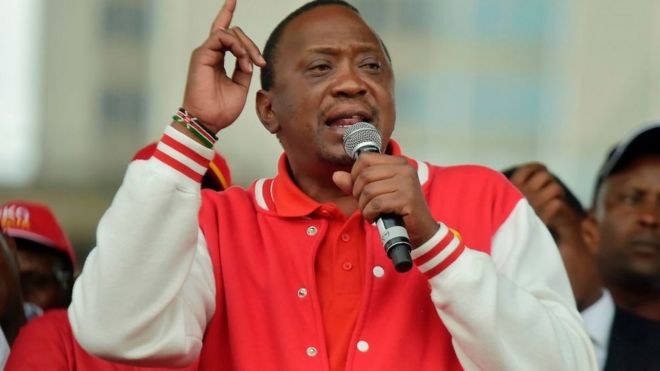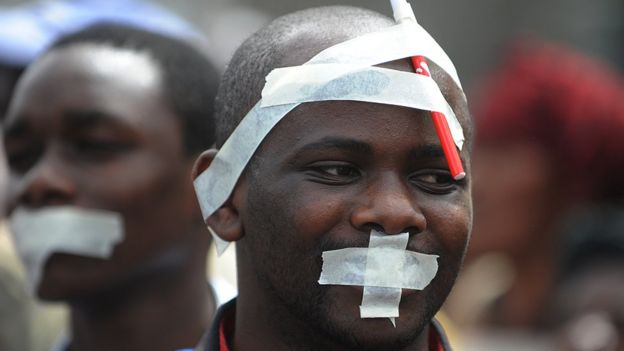 |
| President Kenyatta says the new law will help prosecute cyber criminals |
A new law in Kenya is the latest in East Africa to punish the spreading of "false information" and impose a lengthy jail term on offenders.
It proposes a fine of $50,000 (£37,000) and/or up to two years in prison for publishing "false" information.
The Computer Misuse and Cybercrimes law also criminalises abuse on social media and cyber bullying.
Critics of the "fake news" laws in Kenya, Uganda and Tanzania say they are meant to muzzle independent media.
The Committee to Protect Journalists had urged President Uhuru Kenyatta to send back the bill to parliament to remove clauses that it says violated press freedom and freedom of expression.
The rights body said that parts of the law criminalised unauthorised access and sharing of government data which would remove protection for whistle-blowers.
According to Kenya's Editor's Guild, the law "may be abused by state authorities to curtail media freedom".
Why has the law been passed?
President Kenyatta said in a statement that the new law would provide a legal basis to prosecute cybercrimes, including child pornography, computer fraud and identity theft.
The law also criminalises "unauthorised interference to a computer system" saying that offenders will be fined $100,000 or five years in prison if it threatens national security or results in financial loss.
In March, several MPs complained of cyber bullying, with some lawmakers saying they had been receiving unsolicited nude pictures while others said their names had been used to open fake social media accounts.
What do critics say?
Critics of the new law, however, say that some clauses in the new law are an attempt to return a section of a criminal law that found offenders liable for "undermining the authority of a public officer", which has been used to arrest bloggers for posting comments that some government officials did not like.
 |
| The Kenyan media see the new law as another attempt to muzzle them |
Some bloggers in Kenya have become big media influencers - they boast thousands, sometimes a million, followers on social media platforms and they are known to sell their influence in support of causes online.
Their reputation has earned them the moniker "keyboard warriors".
They were especially busy during last year's election, which was awash with false information on social media.
A local lawyer has wondered about the fate of the government-allied bloggers:
What is happening in Tanzania?
The situation is not dissimilar in neighbouring Tanzania where authorities recently published new regulations which require bloggers to pay $920 (£660) for the privilege of posting content online.
The government says it wants to protect the East African nation from "lies" being spread online, although critics see it as a way of muzzling freedom of expression.#
 |
| President John Magufuli has backed controversial blogging laws |
President John Magufuli says he aims "to weed out" what he refers to as a "disease".
The new rules require all online publishers including bloggers, vloggers and podcasters to register and pay $480 for a three-year licence, plus an annual fee of $440.
The High Court however halted the 5 May implementation of the regulations after a group of activists and representatives from the media challenged them.
If the law passes the court challenge, it would punish offenders with a fine of not less than $2,000 or imprisonment of not less than 12 months, or both.
Tanzania's Bloggers Network said that they were worried about the impact the new regulations would have on its members, suggesting that some may have to stop running their blogs.
A co-founder of the country's most popular website Jamii Forums, a messaging-board, which is dubbed "Swahili Wikileaks', said it might consider closing because of a clause in the regulations that require them to store their contributors' details for 12 months.
What about Uganda's 'gossip tax'?
In Uganda, President Yoweri Museveni's government has put on hold plans for a "social media " tax after the finance ministry said that it would need to consult on how such a tax plan would be implemented.
Mr Museveni had proposed a tax on Facebook and WhatsApp, saying the revenue collected would help the country "cope with consequences of Olugambo [gossiping]".
 |
| President Museveni proposed a social media tax |
He said recently: "We are going to control it [social media]. We know who is spreading hate messages. We shall go for them. You must bring discipline in your systems".
Critics say that the 73-year-old leader's intention is to muzzle the press and those who are against his plan to run again in the 2021 elections. His government shut down social media platforms during the 2016 election.
In a recent meeting with media owners and editors, Mr Museveni urged them to "filter" news and not broadcast "lies".
Uganda is also planning to unveil its own version of Facebook and Twitter this year.
The head of the communication commission Godfrey Mutabazi said that the inspiration to develop local platforms was to host online content in the country, "instead of Ugandans, for example, visiting Twitter, they will have something local that they will be able to use," he is quoted as saying.
Source: BBCNews

No comments:
Post a Comment
Add a Comment...